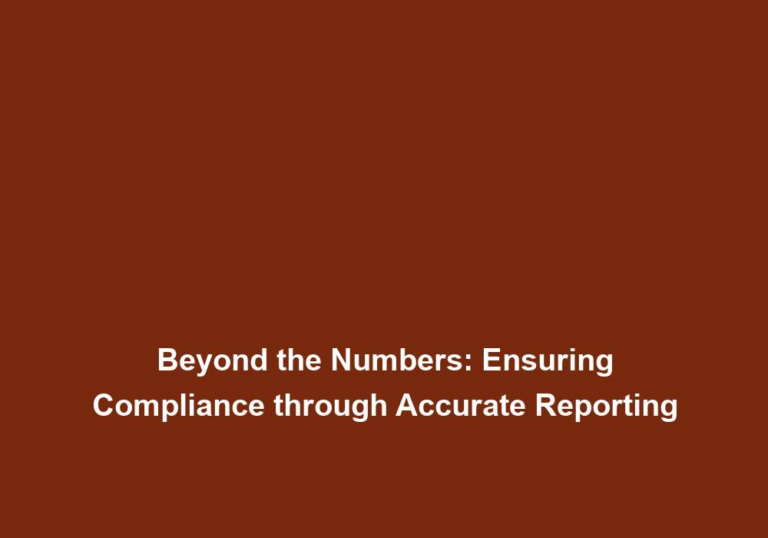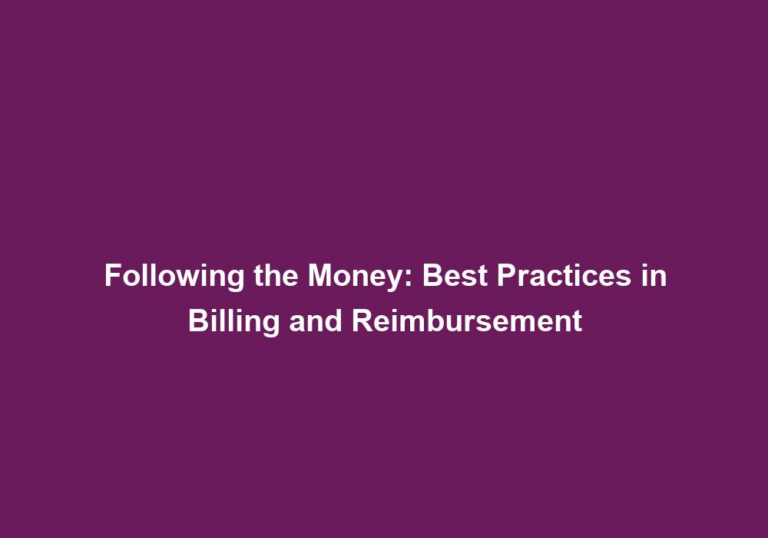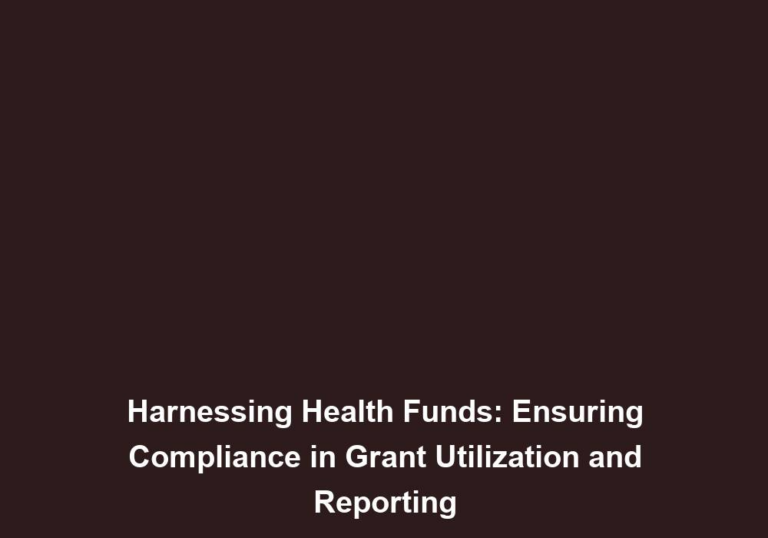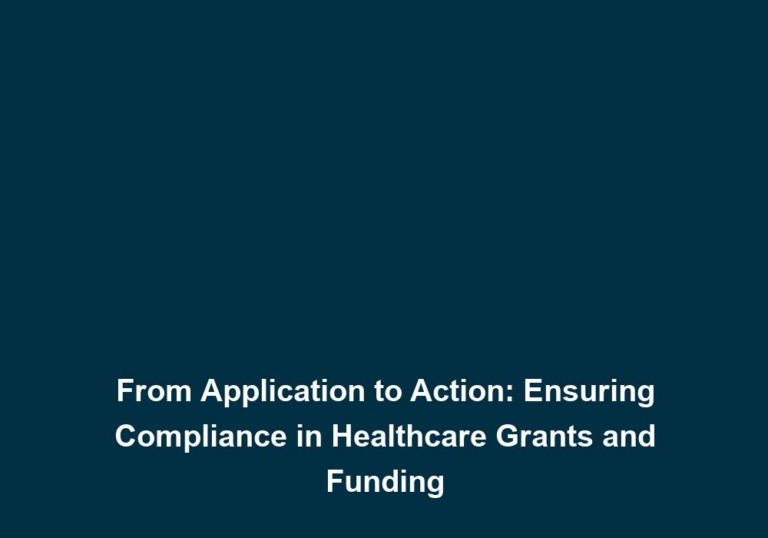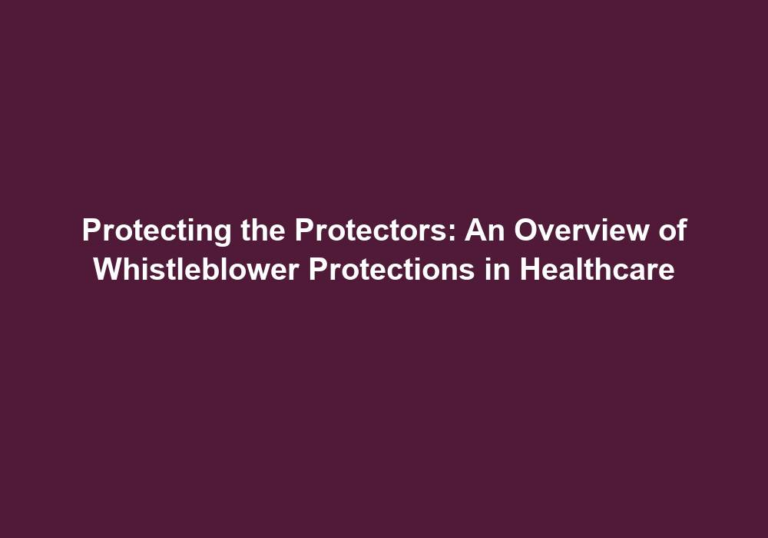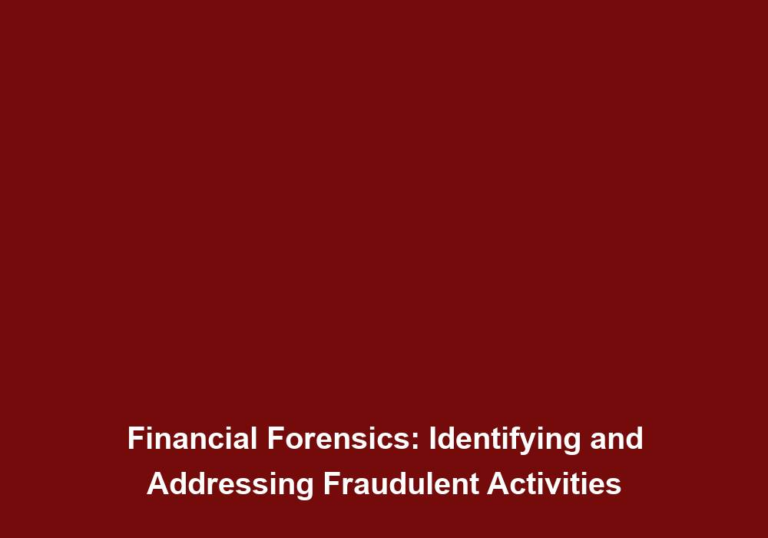Financial Ethics in Healthcare: Strategies for Fraud and Abuse Prevention
Fraud and abuse in the healthcare industry can have devastating consequences, not only for patients but also for the healthcare organizations involved. It erodes trust, compromises patient care, and can lead to severe legal and financial repercussions. To effectively combat fraud and abuse, healthcare providers must prioritize financial ethics and implement robust strategies for prevention. This article explores key strategies that can help healthcare organizations safeguard against fraudulent activities and maintain ethical financial practices.
Understanding Fraud and Abuse in Healthcare
Before delving into preventive strategies, it is important to understand what constitutes fraud and abuse in the context of healthcare. Fraud typically involves intentional deception or misrepresentation for personal gain, such as billing for services not rendered, falsifying medical records, or submitting claims for unnecessary procedures. On the other hand, abuse refers to practices that are inconsistent with accepted healthcare standards but may not involve intentional deception.
Healthcare organizations should be aware of the various types of fraud and abuse that can occur in their industry. Some common examples include:
-
Billing Fraud: This occurs when healthcare providers intentionally overcharge or bill for services that were not provided. It can also involve upcoding, where a provider bills for a more expensive service than what was actually performed.
-
Kickbacks and Referral Schemes: This involves the exchange of money or other incentives in return for patient referrals or the purchase of medical supplies or equipment. These schemes can lead to unnecessary services being performed or the use of inferior products.
-
Prescription Drug Fraud: This includes activities such as prescription drug diversion, where medications are illegally sold or distributed, or the forging of prescriptions for personal use or resale.
-
Identity Theft: Healthcare organizations must be vigilant in protecting patient information to prevent identity theft. This can include safeguarding electronic health records and implementing strict protocols for verifying patient identities.
By understanding the different forms of fraud and abuse, healthcare organizations can better identify and address potential vulnerabilities within their systems.
1. Develop a Strong Ethical Culture
Creating a strong ethical culture within healthcare organizations is instrumental in preventing fraud and abuse. This starts with leadership commitment to ethical behavior and the establishment of clear expectations for all employees. It is crucial to foster an environment where honesty, integrity, and accountability are valued and rewarded.
To develop a strong ethical culture, healthcare organizations can:
-
Lead by Example: Top-level executives and managers should demonstrate ethical behavior in their own actions and decisions. This sets the tone for the entire organization.
-
Communicate Ethical Expectations: Clearly define and communicate the ethical standards expected of all employees. This can be done through employee handbooks, training sessions, and regular reminders.
-
Provide Ongoing Training: Regular training and education programs should be implemented to ensure that staff members are well-informed about the ethical standards, legal regulations, and consequences of non-compliance. This training should be tailored to different roles within the organization and updated regularly to address emerging issues.
-
Encourage Reporting: Establish a reporting mechanism that allows employees to report suspected fraud or abuse anonymously and without fear of retaliation. It is important to emphasize that reporting is a vital part of maintaining an ethical culture and protecting the organization.
2. Implement Robust Internal Controls
Effective internal controls are essential for preventing and detecting fraudulent activities. Healthcare organizations should establish comprehensive policies and procedures that outline appropriate financial practices and segregation of duties. Regular audits and reviews of financial transactions can help identify any irregularities and ensure compliance with regulations.
Key elements of robust internal controls include:
-
Segregation of Duties: Assign different responsibilities to separate individuals to prevent a single person from having complete control over financial transactions. This helps create checks and balances within the organization.
-
Authorization and Approval Processes: Implement clear protocols for authorizing and approving financial transactions. This includes requiring multiple levels of approval for significant expenses and implementing strict controls for access to financial systems.
-
Documentation and Record-Keeping: Establish standardized procedures for documenting and recording financial transactions. This includes maintaining accurate and comprehensive records of patient encounters, procedures, and billing information. Proper documentation ensures transparency and accountability, making it easier to detect any irregularities or discrepancies.
-
Regular Internal Audits: Conduct regular internal audits to evaluate the effectiveness of internal controls and identify areas of potential risk. These audits should be performed by individuals with expertise in healthcare compliance and should cover all aspects of financial operations.
By implementing robust internal controls, healthcare organizations can establish a system of checks and balances that minimizes the risk of fraud and abuse.
3. Conduct Thorough Background Checks
Thorough background checks are crucial when hiring new employees, particularly for positions that involve handling financial transactions or sensitive patient information. This can help identify individuals with a history of fraudulent activities or unethical behavior before they are employed.
When conducting background checks, healthcare organizations should:
-
Verify Employment History: Contact previous employers to confirm the accuracy of the applicant’s work history and to inquire about their performance and behavior.
-
Check References: Speak with individuals provided as references to gain insights into the applicant’s character, work ethic, and integrity.
-
Conduct Criminal Record Checks: Perform criminal record checks to identify any past convictions related to fraud, abuse, or other unethical activities.
-
Verify Education and Credentials: Confirm the validity of the applicant’s education and professional credentials, such as degrees and certifications.
It is important to ensure that background checks comply with legal requirements and protect the privacy rights of applicants.
4. Implement Proper Documentation and Record-Keeping Processes
Accurate and comprehensive documentation and record-keeping are critical for preventing fraud and abuse in healthcare. Healthcare organizations should establish standardized procedures for documenting patient encounters, procedures, and billing information. This ensures transparency and accountability, making it easier to detect any irregularities or discrepancies.
Proper documentation and record-keeping processes should include:
-
Electronic Health Records (EHR): Implement secure and robust EHR systems that allow for accurate and efficient documentation of patient care. This includes capturing relevant medical history, treatment plans, and billing information.
-
Coding and Billing Compliance: Ensure that coding and billing practices align with industry standards and regulations. Healthcare organizations should provide training and resources to staff members to ensure accurate and ethical coding and billing practices.
-
Regular Audits and Reviews: Conduct periodic audits and reviews of documentation and coding practices to identify any discrepancies or potential areas of risk. This can be done internally or with the help of external auditors or consultants.
By implementing proper documentation and record-keeping processes, healthcare organizations can enhance transparency, reduce the risk of errors or intentional manipulation, and improve overall financial and operational efficiency.
5. Encourage Whistleblowing and Reporting
Creating a culture that encourages and protects whistleblowers is essential for early detection and prevention of fraudulent activities. Healthcare organizations should have clear reporting mechanisms in place, ensuring anonymity and protection from retaliation for those who report suspected fraud or abuse. Regular communication and awareness campaigns can help raise awareness about the importance of reporting and the potential consequences of fraudulent activities.
To encourage whistleblowing and reporting, healthcare organizations can:
-
Establish Confidential Reporting Channels: Provide multiple avenues for employees to report suspected fraud or abuse anonymously. This can include hotlines, online reporting systems, or dedicated email addresses.
-
Ensure Non-Retaliation Policies: Clearly communicate that retaliation against individuals who report suspected fraud or abuse will not be tolerated. This includes protecting whistleblowers from any form of adverse action or discrimination.
-
Investigate and Address Reports Promptly: Act promptly on any reports received and conduct thorough investigations into alleged fraudulent activities. This demonstrates the organization’s commitment to integrity and accountability.
-
Promote a Culture of Trust and Transparency: Foster an environment where employees feel comfortable speaking up about potential issues and know that their concerns will be taken seriously. This can be achieved through open communication, regular training, and recognition of ethical behavior.
By actively encouraging whistleblowing and reporting, healthcare organizations can uncover potential fraud or abuse early on and take appropriate actions to prevent further harm.
6. Stay Informed About Regulatory Changes
Healthcare regulations and laws are constantly evolving. Staying informed about these changes is crucial for healthcare organizations to ensure compliance and prevent fraudulent activities. Organizations should designate individuals or teams responsible for monitoring regulatory updates and implementing necessary changes to policies and procedures accordingly.
To stay informed about regulatory changes, healthcare organizations can:
-
Establish Regulatory Monitoring Systems: Assign individuals or teams to monitor relevant regulatory bodies, such as government agencies or industry associations. These individuals should regularly review updates, guidance documents, and new legislation.
-
Engage in Continuing Education and Professional Development: Encourage staff members to participate in relevant training programs, webinars, or conferences to stay up to date with the latest regulatory changes and best practices.
-
Collaborate with Industry Peers: Participate in professional networks and associations to share knowledge and insights about regulatory changes. This can include attending industry conferences, joining online forums, or participating in working groups.
By proactively staying informed about regulatory changes, healthcare organizations can adapt their practices and policies accordingly, reducing the risk of non-compliance and fraudulent activities.
7. Regularly Conduct Compliance Audits
Regular compliance audits are vital for identifying areas of weakness and areas where fraudulent activities may occur. These audits should be conducted by internal or external professionals with expertise in healthcare compliance. The findings of these audits can help healthcare organizations implement necessary improvements and ensure ongoing adherence to ethical financial practices.
Key considerations for conducting compliance audits include:
-
Scope and Frequency: Determine the scope and frequency of compliance audits based on the size of the organization, the complexity of operations, and the level of risk. This may include conducting audits annually, quarterly, or as needed.
-
Documentation and Evidence Collection: Maintain detailed documentation of audit processes, findings, and remedial actions taken. This includes collecting evidence, such as financial records, policies, and employee interviews.
-
Corrective Actions and Follow-Up: Implement corrective actions based on audit findings and monitor their effectiveness. Regularly follow up on previously identified issues to ensure ongoing compliance.
-
External Audit Support: Consider engaging the services of external auditors or consultants with expertise in healthcare compliance to provide an objective assessment of the organization’s practices.
By regularly conducting compliance audits, healthcare organizations can proactively identify areas of non-compliance, mitigate risks, and continuously improve their fraud and abuse prevention efforts.
8. Establish Clear Financial Policies
Clear and comprehensive financial policies provide guidance to staff members, reducing the risk of unintentional fraudulent activities. These policies should outline procedures for billing, coding, reimbursement, and financial transactions, ensuring transparency and consistency in financial practices.
Key elements of clear financial policies include:
-
Billing and Coding Guidelines: Provide detailed guidelines on accurate coding practices, including appropriate use of modifiers, documentation requirements, and billing procedures. This ensures that financial transactions are properly documented and coded.
-
Reimbursement Policies: Establish policies and procedures for handling reimbursements, including eligibility criteria, documentation requirements, and claims submission processes. This helps prevent fraudulent reimbursement claims and ensures compliance with payer requirements.
-
Expense Approval and Reporting: Define clear procedures for approving and reporting expenses, including the use of expense reports, receipts, and approval thresholds. This helps prevent unauthorized or improper expenses.
-
Vendor and Supplier Management: Establish guidelines for selecting and managing vendors and suppliers, including due diligence processes, contract requirements, and payment procedures. This reduces the risk of fraudulent activities by external parties.
By establishing clear financial policies, healthcare organizations can provide staff members with a framework for ethical financial practices and minimize the likelihood of unintentional fraudulent activities.
9. Implement Monitoring Systems
Implementing robust monitoring systems can help detect and prevent fraudulent activities in real-time. Advanced data analytics, artificial intelligence, and machine learning can be utilized to identify patterns and anomalies in financial transactions, flagging potential cases of fraud or abuse for further investigation.
Key components of monitoring systems include:
-
Data Analytics Tools: Implement data analytics tools that can analyze large volumes of financial data to identify patterns, trends, and outliers. These tools can help detect unusual billing patterns, inconsistencies, or suspicious transactions.
-
Rules-Based Alerts: Set up rules-based alerts that trigger notifications when predefined thresholds or criteria are met. For example, an alert can be triggered when a certain number of claims are submitted within a short period of time.
-
Artificial Intelligence and Machine Learning: Leverage artificial intelligence and machine learning algorithms to analyze data and learn from past patterns. These technologies can help identify new and emerging fraud schemes that may be difficult to detect using traditional methods.
-
Real-Time Monitoring: Implement real-time monitoring systems that provide instant alerts or notifications when potential fraudulent activities are detected. This allows for immediate investigation and intervention.
By leveraging advanced monitoring systems, healthcare organizations can proactively detect and prevent fraudulent activities, minimizing the financial and reputational risks associated with fraud and abuse.
Conclusion
Financial ethics play a critical role in healthcare organizations’ ability to prevent fraud and abuse. By prioritizing ethical behavior, establishing strong internal controls, and implementing preventive strategies, healthcare providers can safeguard their finances, protect patient care, and maintain the trust of the communities they serve. Compliance with regulatory requirements, regular audits, proper documentation, and ongoing staff education are all integral components of an effective fraud and abuse prevention program. By adhering to these strategies, healthcare organizations can contribute to a culture of transparency, integrity, and ethical financial practices in the healthcare industry.


